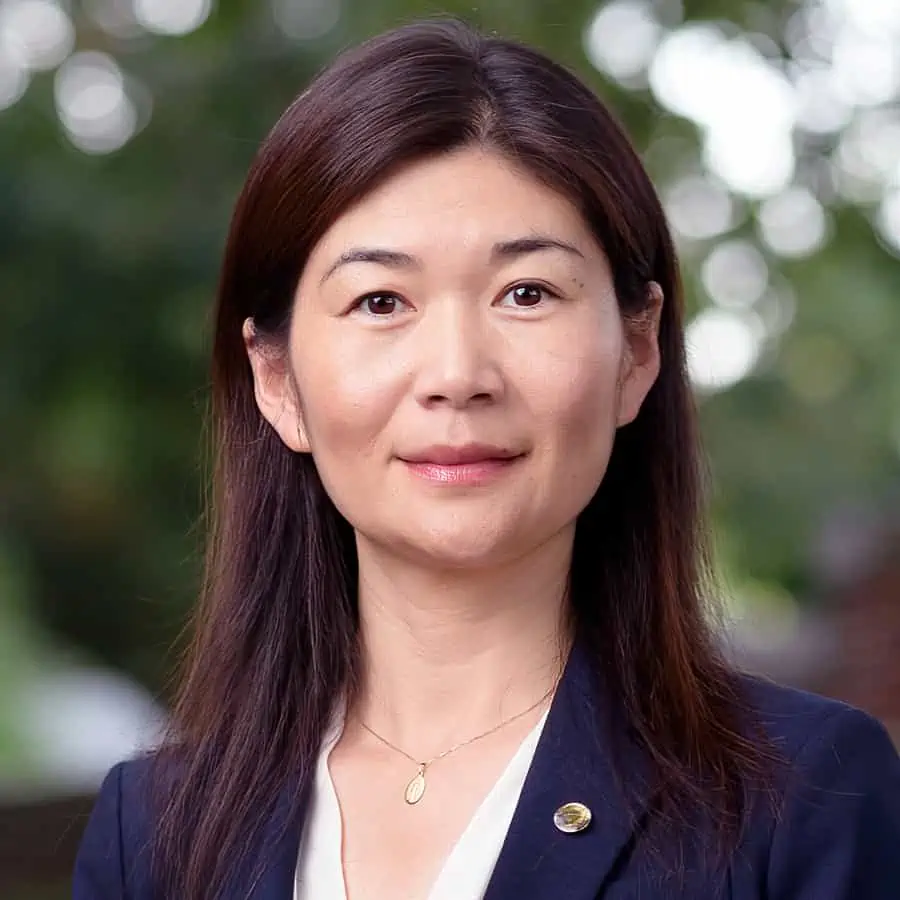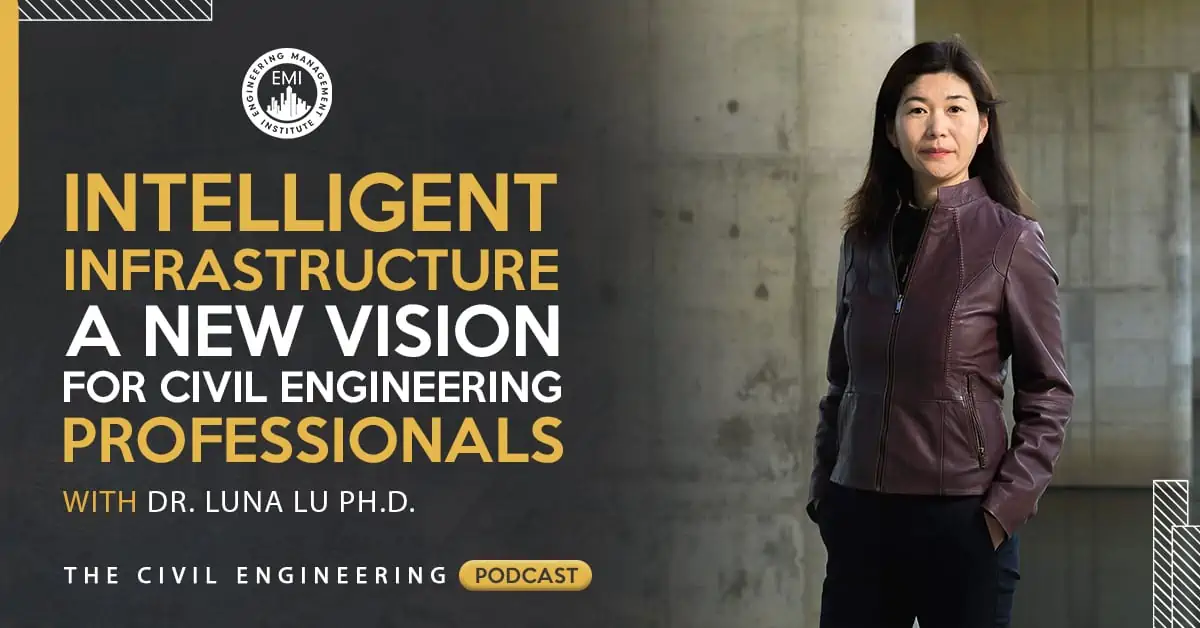Podcast: Play in new window | Download | Embed
In this episode, I talk to Dr. Luna Lu Ph.D., the ACPA Professor and Director of the Center for Intelligent Infrastructure at Purdue University, about intelligent infrastructure and how it can benefit civil engineers and the community.
Engineering Quotes:
Here Are Some of the Questions I Ask Dr. Luna Lu Ph.D.:
- Can you please provide us with an update on the condition of the U.S. infrastructure from your perspective?
- Please tell us more about the discovery of functional nanomaterials with tunable properties for energy harvesting and infrastructure sensing applications, and what intelligent infrastructure is?
- How would you say one can achieve intelligence?
- What is the overall goal you would like to achieve with the research on sensors that could speed up construction schedules?
- In your article in The Exponent called “Building the way to a smart future,” it mentions that smart infrastructure aims to create roadways and bridges that can communicate with cars and collect data. How will that work?
- Can you share with our listeners some of the other exciting projects you are currently working on?
Here Are Some Key Points Discussed in This Episode About Intelligent Infrastructure:
- The average grade of the infrastructure of the U.S. is currently at C-. It means that there are areas in the infrastructure that are in jeopardy. The water infrastructure has a breakdown in the U.S. every two minutes, which calculates to 6 million gallons of freshwater lost per day. And an average of 43% of public roads are in poor to mediocre condition. Of the 6 million bridges in the U.S., 13% are structure obsolete. The traffic jams caused by the out-of-date roads’ infrastructure cost the people in the U.S. 4 billion hours and 3 billion gallons of fuel per year. It indicates that the time has come to start working on the next generation of infrastructure, and it must be intelligent.
- Technology has advanced exponentially in recent years. Our infrastructure was not built to support new technologies, such as autonomous driving cars. It adds another challenge on top of the existing infrastructure.
- Nanotechnology for making material tunable, energy harvesting, and infrastructure sensing can sense the strengths of concrete and tell engineers when it has cured enough and will not sustain premature damage. It helps to make more accurate, data-driven decisions about the concrete. It indicates when further maintenance is needed to be performed on the concrete before a total collapse to a critical point happens.
- Self-healing materials can fix their cracks if the crack is small enough. It helps to prolong the maintenance frequency. It also reduces the impact of corrosion and other durability issues.
- Intelligent infrastructure is an infrastructure that is self-healing and is adaptive to human needs. Intelligent infrastructure can notify its users of its condition and send recommended steps to be taken to use it safely. It can also proactively respond to natural disasters to minimize damage caused to it and its users. It makes the infrastructure sustainable, durable, adaptive, autonomous, and secure.
- To achieve intelligence, we need to converge different disciplines. Traditional civil engineering will need to involve sensing, data analysis, and optimization. It can only be done if many disciplines work together.
- The productivity of civil engineers has been slow due to them needing to make educated guesses on many occasions. In most projects, concrete is introduced early in the project’s schedule. If real-time data could increase productivity by 1 to 10% for every stage of the concrete schedule, it will have a major impact on the entire project. It can reduce the margin of civil engineers needing to “over-design” projects to ensure a factor of safety.
- The idea behind using intelligent infrastructure is to achieve safety, mobility, sustainability, and security. It can sense the speed at which traffic is moving, the condition of the road, and if there are any hazards you should be aware of. It can send recommended actions to the users so that everyone can have the best user experience possible.
- The pandemic has accelerated technology adoption in many ways. Things like artificial intelligence and machine learning are now used in the construction industry. It is a challenge to get civil engineers to adapt to new technology at an accelerated speed. We need to work together to transfer this challenge to opportunity.
More Details in This Episode…
About Dr. Luna Lu Ph.D.

Dr. Lu has extensive research expertise in nanomaterials synthesis, device development and related sensor technologies for energy harvesting and structure sensing and monitoring. Her research program integrates civil engineering, electrical engineering, and materials science disciplines with three main topic areas: 1) thermoelectric materials for waste heat recovery, 2) piezoelectric materials for energy harvesting and sensing and 3) multi-functional materials for energy harvesting. She has authored over 100 peer-reviewed publications: 2 book, 6 book chapters, 1 patent and 4 provisional patents. She has given numerous keynotes and invited and contributed talks at top research conferences, including Material Research Society (MRS), The Mineral, Metals and Materials (TMS), SPIE Photonic West and IEEE Conferences on Smart Cities, etc. Her research work has been featured in many international and national media. She has won several scientific awards, including the 2014 National Science Foundation (NSF) CAREER Award, 2019 Purdue Faculty Scholar and 2020 Vebleo Scientist Award, etc. She has also transferred few technologies from her research lab into engineering applications, and formed companies based on her innovations.
https://engineering.purdue.edu/SMARTLab
Books Mentioned in This Episode:
The Code Breaker: Jennifer Doudna, Gene Editing, and the Future of the Human Race
Sources/References:
Purdue University
ASCE Infrastructure Report Card
Purdue’s Concrete Sensor Research
Building the Way to a Smart Future
Center for Intelligent Infrastructure
SMARTLab
Connect with Dr. Luna Lu Ph.D. on LinkedIn
To your success,
Anthony Fasano, PE, LEED AP
Engineering Management Institute
Author of Engineer Your Own Success







